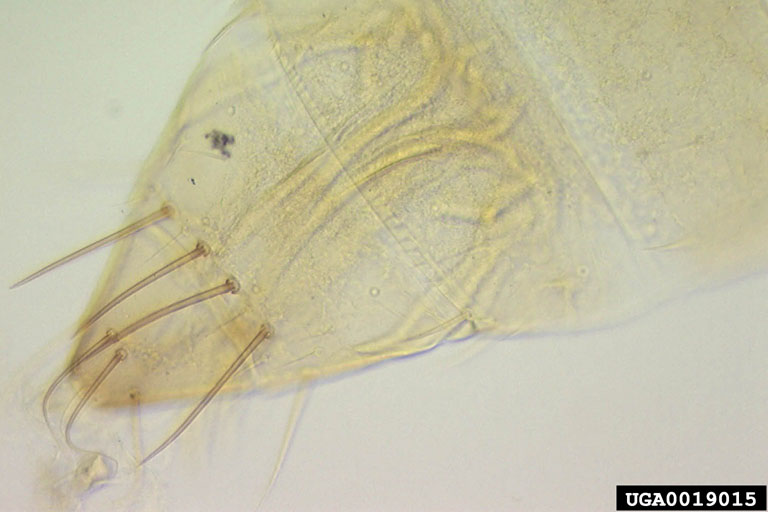Grass Thrips
Insecta (Hexapoda) > Thysanoptera > Thripidae
Anaphothrips obscurus (Muller)
Photographer: John W. Dooley, USDA APHIS PPQ
Descriptor: Identification
Description: Host: Iris, grains (rice, wheat, corn), and grasses
Males of A. obscurus are not known; worldwide the species has never been confirmed to be other than parthenogenetic. The females are dimorphic, either fully-winged (macropterous), or short-winged (micropterous or brachypterous). The macropterae are mainly yellow in colour, although the posterior margin of the head has a brown transverse marking, and the anterior tergites are variably shaded with brown; the forewings are slightly yellow, and the distal antennal segments are mainly brown. Micropterous individuals are usually almost clear yellow. The head and pronotum have no long setae, in contrast to most other pest thrips species. The abdominal tergites are completely sculptured medially, and the eighth abdominal tergite has a complete comb along the posterior margin.
Image shows complete comb on 8th abd segment Host and distribution information from Crop Protection Compendium (CPC) and SFO collection Europe, Asia, Africa, Oceania, pacific, Western Hemisphere CPC Damage: Kamm (1971) recorded a 16% reduction in seed yield of bentgrass (Agrostis stolonifera) in Oregon, USA, and added that subsequent damage to the leaves of the plants almost certainly resulted in further yield reduction. In other reports of yield reduction in grasses grown for seed it is clear that A. obscurus is only one of a group of thrips species that are associated with such damage (Zawirska, 1970). Near Beijing in China, Han et al. (1979) noted that A. obscurus caused serious damage to young maize in late spring if large populations had first built up on wheat in spring and then migrated to maize. Rains depressed population size, but drought increased them.
Location: United States
Image Citation:
John W. Dooley, USDA APHIS PPQ, www.forestryimages.org
Image Use:
This image may be copied and used, in whole or in part, for any non-profit, educational purpose provided that all reproductions bear an appropriate credit. Any commercial or other use of the image requires the written permission of the photographer or contact organization, and Forestry Images. |

